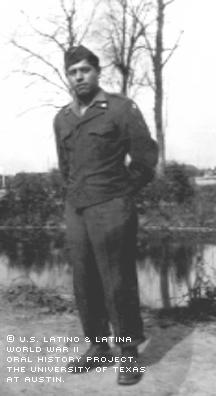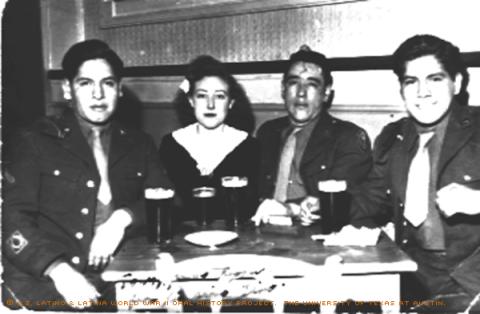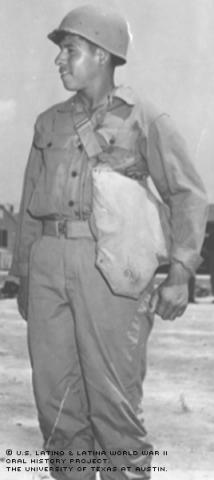


By Matthew Trana
When Tony Reyna arrived at Normandy Beach on June 9, 1944, three days after the D-Day launch, he couldn't believe his eyes.
"It was real rough," Reyna said. "...People cut in half. Some had no head, some had no legs. It was real bad."
More than 50 years later, Reyna, a retired supervisor for Economy Furniture, resides in South Austin with his wife of 53 years, Connie. He went from working on his father's farm as a teenager to participating in what is arguably the most important military offensive of all time. Reyna attributes his life's success to what he gained from World War II.
"I saw a lot of countries. I saw a lot of cultures," Reyna said. "I learned one thing from that. There [are] good people anywhere and there [are] bad people too anywhere. You can't judge one for all of them. A lot of people do that and that's wrong."
Antonio Ramos Reyna was born on Jan. 17, 1922, in Hays County in Austin, Texas, and grew up there until he left for the service in 1942. One of 12 children, Reyna attended Newhop Elementary School in Niederwald, Texas, with his brothers and sisters. Sharing one classroom with 40 other students, Reyna assisted his teacher with the first and second grade students.
"I was in fourth grade and always did my work right away. I had time to help the teacher," Reyna said. "They were in the first grade and just reading, and with the ABC's, and with small numbers, that's about it."
After completing the sixth grade, Reyna started helping out on his father's farm, sometimes working more than 10 hours a-day. In the wintertime, Reyna would plow the land so he and his family could plant the crops in the springtime. When he wasn't working on the farm, Reyna was playing either dodgeball or football and he was hunting, usually pheasant or quail.
Looking back on his youth, Reyna clearly remembers one event: the Great Depression.
"That hurt everybody because there [were] a few jobs," Reyna said. "The problems was that nothing had value. The beef didn't have value. The chicken didn't have value. Whatever we raised, it didn't have value at all."
Besides goods' lack of value, Reyna's family was not hit too hard by the Great Depression.
On Dec. 7, 1942, exactly one year after the bombing of Pearl Harbor, an eager Reyna was drafted by the Army into the 29th Infantry. One month later, he would turn 20 years old.
After finishing basic training in Ft. Benning, Ga., and maneuvers in Massachusetts and South Carolina, Reyna shipped out to Iceland. More than anything, Reyna remembers the cold, Icelandic wind.
"The cold was okay because we had pretty heavy clothes," Reyna said. "But the wind, it goes to 40 miles, 35 miles, all the time. The wind makes the weather; it was like zero or below, a whole lot colder."
After eight months in Iceland and a three-month stint in Southampton, England, Reyna was stationed in Liege, Belgium, and remained there for most of the war. In addition to the many skirmishes that occurred in Liege, Belgium, Reyna also participated in what are considered the two most important battles of World War II: the D-Day invasion and the Battle of the Bulge.
Reyna recalled how he felt prior to going in to D-Day.
"I think we [were] pretty well prepared to go. In my mind, I always thought we [were] going to win," Reyna said. "The only thing I was thinking was maybe we [weren't] coming back."
Reyna served as a "clean-up man" during the Normandy invasion. He and other soldiers would restore order to small villages devastated by the ambush and "take care" of any snipers left behind.
In addition to the D-Day invasion, Reyna also fought in the Battle of the Bulge. His division was able to weaken the German army by burning most of their gasoline depots.
There was a lot confusion at the Battle of the Bulge Reyna admitted, claiming "we [were] prisoners and didn't know it." Due to poor communication, Reyna's squad was unaware many of their generals had already been killed.
Reyna recalls another incident where lack of organization played a factor.
"Sometimes it [got] a little disorganized because [the enemies] bomb a place where you are, and you don't know what to do right away," Reyna said. "Like this thing that happened when we [were] guarding the main highway going to Germany when we [were] in Liege, Belgium. One squad was on guard for four hours a day-we went from eight to 12-and then [another squad would] relieve us. Ten minutes later, we [were] released and a bomb hit and killed the whole squad and 19 civilians. We had just left and we [were] about half-a-mile from the place where we [were] staying. We heard the bomb when it hit but didn't know it hit right where we were. That was a rough, rough one."
Reyna recalls another horrific incident that, after all of these years, still sticks out in his mind.
"One time we [were] in town when one of the bombs hit," Reyna said. "We went around, and...there was a lady there, dead...and the little girl was about six, seven months. She was nursing from her mother and her mother was dead. That was a pretty awful sight to see."
Reyna was soon transferred to Frankfurt, Germany, where he eventually learned the war was over. To this day, he regards his homecoming as one of the "happiest moments of [my life]" and still remembers how powerful it felt to see the Statue of Liberty upon arriving to the United States.
After resting for a couple of weeks, Reyna went back to work, first, as a plumber's assistant. Soon, he purchased a two-and-a-half ton truck and started taking workers over to Michigan to farm sugar beets. Tired of the long hours, Reyna sold his truck to his father and began working as an assembler for Economy Furniture where he would one day become supervisor in the shipping department.
Shortly after returning to Austin from the war, Reyna met his current wife, Connie Loera. He recalls how the two met.
"I had been here almost three weeks and went to a dance," Reyna said. "I met her and we danced a couple of pieces and she asked me where I was from. I said, 'Well, I just moved to Austin.' Then I asked her how long she had been in Austin, and she said she was born over here at Ben White and Congress. So, we started talking about it and I guess she kind of liked talking to me and I kind of liked talking to her and from there we just...every weekend she would call me. That was the good old days."
The two have been married for more than 53 years and have six children together.
Reyna has led a long life and is thankful for everything he has. Each day is a gift for the 78-year-old veteran. Reyna offered younger generations a few simple guidelines to lead a successful life.
"Stay in school, obey [your] parents and obey the law too, because if not, [you're] going to be lost."

